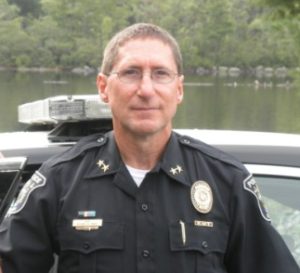The many roles of RSU #18’s SROs
by Mandi Favreau

Tracey “Frosty” Frost, SRO for RSU18
When students arrive at Messalonskee High School, the first face they often see is that of Detective Tracey Frost. “Frosty” as the kids call him, is a reassuring presence, rather than an intimidating one. He has a booming “good-morning,” a witty comment for each kid, and can call most of them by name.
At Messalonskee Middle School, Sergeant Adam Sirois starts his day in a similar manner, greeting students with a smile and a quiet “hello,” complimenting their hat, asking about their weekend. “He is always chatting with the kids, either one on one or in small groups,” said head Administrative Assistant Tracey Foster.
For both of these men, their day is spent wearing many hats. A school resource officer (SRO) is part counselor, part teacher, part enforcer, and part defender. There’s no such thing as a typical day in the life of an SRO; they simply play too many roles in the school setting. “I try to fulfill whatever need is present,” said Detective Frost. “I’ve investigated threats, searched students for weapons, taught young men how to tie ties, investigated DHHS issues and sexual assaults, assisted in drug investigations, delivered death notifications, assisted with suicidal students, handled traffic complaints, stood by for custody disputes, taught classes in Civics, Health and Criminal Justice, recovered lost property and investigated sexting complaints. Every once in a while, I get to sit back and enjoy a cup of coffee.”
The student resource officer program in RSU #18 started in January of 1999 with now Police Chief Mike Tracy as the district’s first SRO. The SROs are always Oakland Police Officers but are also deputized as Kennebec County Sheriffs in order to be able to cover all the schools in the district as needed. “The schools and the police department have always had a very strong relationship, even before the start of the program,” said Chief Tracy. He added that while the job has changed with the times, the basics have stayed the same. ”We work together with the safety of the students in mind.”
While the national media has, naturally, been focusing on the role that school resource officers may play during an incident of school violence, that is only one of the many situations where these officers may be called on to protect students. According to Superintendent Carl Gartley, having armed SROs has been key in keeping students safe in a variety of situations that could have become much more difficult without their intervention.
Their presence is also extremely reassuring to the school community. “Students and parents appreciate having Detective Frost in our building as he is a great resource for them to reach out to when they have specific issues that they need help with,” said MHS Principal Paula Callan. She also added that he is the school’s “go-to person” for delivering food baskets and gifts to families over the holidays, and behind the scenes, he is in charge of running drills and updating staff on security protocol.
Frost acknowledges that though his role at the high-school is primarily that of protector and investigator, he feels he is most effective as a mentor. “I try to position myself to be approachable,” said Frost. “When a student wants to talk about what’s going on at home, or online, I want them to feel comfortable coming to see me with the assurance that I will do my best to help.” He added that he believes that this is the best defense against potential school violence. “Students feel comfortable texting, emailing or talking to me. I am usually successful at getting information that a problem exists before it becomes a fight or something worse.”
Forging relationships with the students they work with is key for SROs to be effective. For Sirois, it’s also his favorite part of the job. Many of the students he works with frequently need more “positive interaction with adult authority figures,” and providing that can have a huge impact. “Adam builds great relationships with students and has many discussions with them on topics around bullying, being safe online, avoiding legal issues and other topics,” said MMS Principal Mark Hatch.
The job also has its fair share of challenges. For Frost, the biggest one is the heartache of knowing that 90 percent of the students he interacts with in his official role grew up in poverty with little to no positive parenting; this makes reaching them difficult. “I deal with the same 20 students over and over again,” said Frost. “Sometimes this is very challenging and, quite frankly, tiring.” He agrees with Sirois that being able to make a difference with those kids is the greatest reward. “Every once in a while, I get a victory where a student who is going down a hard road gets in trouble and I am able to turn that kid’s life around.”
Safety in our schools has always been a priority in RSU #18 and will continue to be so. “Unfortunately, just living in rural Maine is no longer enough to say we are safe,” said Superintendent Carl Gartley. “In today’s world, we need to have our building secure, we need to have buzz-in systems and cameras in our schools.” He added that the schools and town are working together to explore a variety of additional improvements that can be made to our security protocol, from the possibility of additional resource officers to modifications in the physical structures of some of the buildings.
Both Detective Frost and Sergeant Sirois feel that there is a lot to be said for the current state of security in the district, despite some architectural challenges in the older schools. “Our crisis plans are state of the art and are updated regularly,” said Frost. “We have more SROs than any other district in the area. Our management team takes security seriously. We have a substantial number of cameras. We work well with surrounding police and fire departments.” He added that there is a balance to be had between ensuring safety and turning our schools into prisons. “We want to remain a welcoming environment, not a detention facility. It’s a balance that everyone is struggling with.”
This article first appeared on the RSU18 website.
Responsible journalism is hard work!
It is also expensive!
If you enjoy reading The Town Line and the good news we bring you each week, would you consider a donation to help us continue the work we’re doing?
The Town Line is a 501(c)(3) nonprofit private foundation, and all donations are tax deductible under the Internal Revenue Service code.
To help, please visit our online donation page or mail a check payable to The Town Line, PO Box 89, South China, ME 04358. Your contribution is appreciated!




Leave a Reply
Want to join the discussion?Feel free to contribute!